Greetings, True Believers and welcome back to another Retro RPG Review! This time we’re celebrating the release of Avengers: Infinity War with one of the classic superhero RPGs. Though there have been many, there’s only one that can properly cover this level of event!
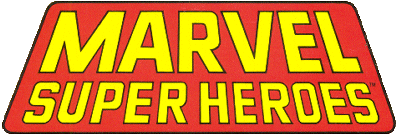
So, grab that Crown Royal bag full of Infinity Stones as we pry the lid off of Marvel Super Heroes!
Secret Origins
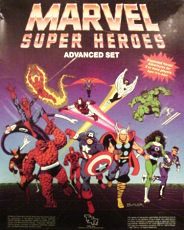 Marvel Super Heroes was first published in 1984 as Marvel Super Heroes: The Heroic Role-Playing Game It was a simple game, designed by game design luminary Jeff Grubb, to allow players to assume the roles of some of Marvel’s famous heroes. This version became known as the “Basic Set” when Marvel Super Heroes Advanced Set, which was published in 1986, expanded the power levels of characters and added rules for campaign level play. Finally, in 1991, the Revised Set was published, reconciling the two previous sets, clarifying some rules, and updating the roster of available heroes.
Marvel Super Heroes was first published in 1984 as Marvel Super Heroes: The Heroic Role-Playing Game It was a simple game, designed by game design luminary Jeff Grubb, to allow players to assume the roles of some of Marvel’s famous heroes. This version became known as the “Basic Set” when Marvel Super Heroes Advanced Set, which was published in 1986, expanded the power levels of characters and added rules for campaign level play. Finally, in 1991, the Revised Set was published, reconciling the two previous sets, clarifying some rules, and updating the roster of available heroes.
All versions of the game come with some great accessories. The first are maps. Each boxed set comes with a poster-sized, street-level, map of a portion of Marvel’s silver-aged New York City. This is great for those street-level campaigns where you can actually have the likes of Daredevil prowling the mean streets of Hell’s Kitchen. The flip side of the map is usually a grassy/forest area or interior maps of some key buildings (Avengers Mansion, Baxter Building, Daily Bugle, etc.).
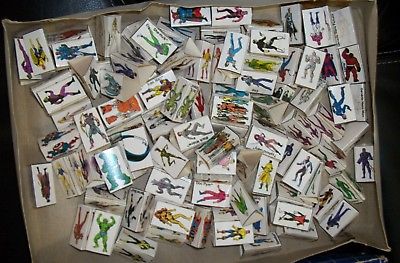 The next accessories are the pre-defined hero cards for 45(!) Marvel characters that are ready-to-play. These handy cut-out cards provide a full-body portrait of the character on the front and the stats on the back. Finally, there are the character tokens. These things made the game so memorable. They are three-sided cutouts that you folded and glued into a triangle and stood up. There was one for each hero and villain included with the set as well as a few for bystanders, police, and crowds. They were a great alternative to pewter miniatures which were never going to be possible for that scale of a roster.
The next accessories are the pre-defined hero cards for 45(!) Marvel characters that are ready-to-play. These handy cut-out cards provide a full-body portrait of the character on the front and the stats on the back. Finally, there are the character tokens. These things made the game so memorable. They are three-sided cutouts that you folded and glued into a triangle and stood up. There was one for each hero and villain included with the set as well as a few for bystanders, police, and crowds. They were a great alternative to pewter miniatures which were never going to be possible for that scale of a roster.
“We Can be Heroes…”
Marvel Super Heroes provides two options for superhero play. You can choose from one of the pre-defined Marvel super heroes or build your own. Playing the predefined characters is really a great way to get started as you just pick your character, take their card and token, and play. The limitation here is that these characters were generated for their status in the comics in 1986. For example, The Beast (X-Men) has not transformed into his more famous, blue-furred appearance and Storm (also, X-Men) is listed as currently being powerless due to story plot in the comics. This means that you may need to do some modification if you want to play a certain version of a character or look for updates in the online community (more on that later).
The second option of building your own superhero is what most people who play the game will want to do. To do that you can roll a character randomly or model a character based on a concept you have in mind. Random characters can be a blast, but when you end up with a character that has water-breathing and plant control you might have second thoughts. Character modeling is the best way to go here. To do so, you decide where each of your character’s abilities and powers stack up against the pre-defined heroes and assign the appropriate rank. (“My character is stronger than Captain America but not as strong as Thor.”) This is a great exercise with all of the players as it lends itself to those classic superhero debates (“Who’s smarter, Reed Richards or Tony Stark?”)
The primary attributes in Marvel Super Heroes have the second-greatest acronym in all RPGs (THAC0 being the first). FASE RIP aka “face rip”(!) stands for the physical attributes: Fighting, Agility, Strength, and Endurance (FASE) and the mental attributes: Reason, Intuition, and Psyche (RIP). The secondary abilities of Health and Karma are derived from FASE and RIP respectively. Health is the character’s hit points. Spending Karma allows the player to affect the game, from adding to dice rolls to using your powers in ways they’ve never been used before called Power Stunts. Karma is gained back by doing heroic deeds or by good role playing. Karma can also be spent to advance your character.
To round out your character you choose your superpowers from a list of over 100 choices, add some talents/skills, and select some contacts to determine who you can reach out to when you need help.
All of these things are given Ranks which are super-heroically descriptive labels ranging from Feeble (1-2) to Unearthly (88-125) and all the way to Beyond (literally infinite). Most characters stay in that Feeble to Unearthly range with many in the 20s (Excellent), 30s (Remarkable), and 40s (Incredible). These Ranks are used to determine successes and failures using one of the more unique RPG mechanisms, the FEAT Roll.
Saving the Day!
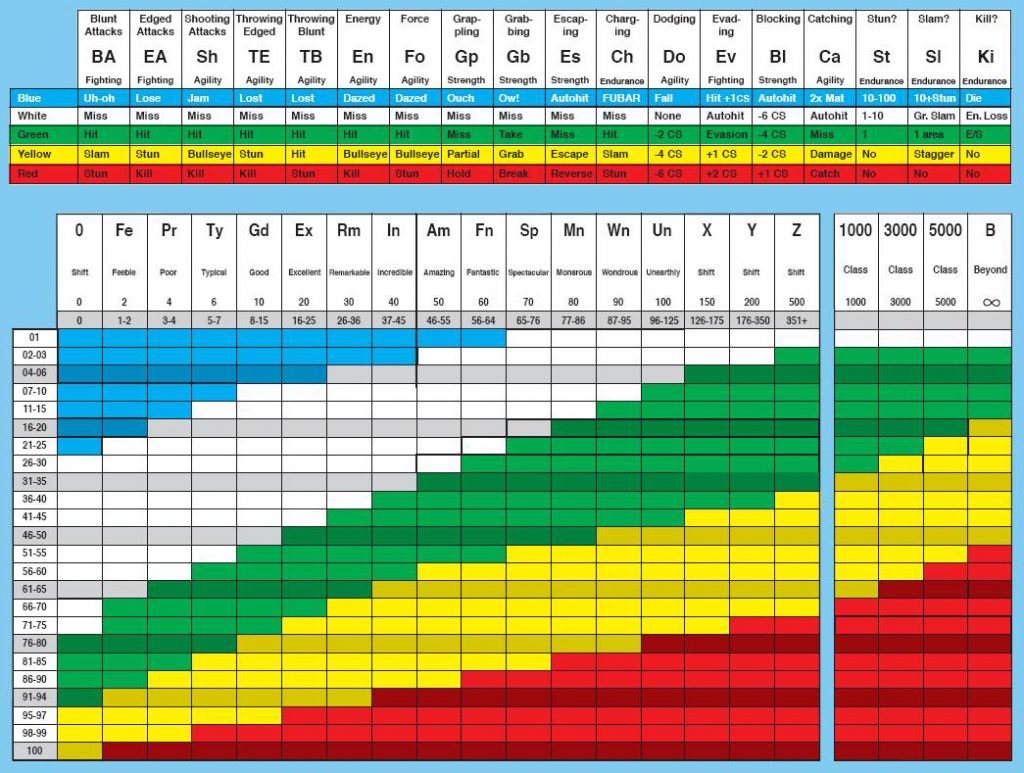
FEAT (Function of Exceptional Ability or Talent) Rolls are made by rolling two 10-sided dice to get a percentage and then cross referencing that on the Universal Table with the Rank of the attribute, power, or talent being tested. The Universal Table lists outcomes in white, green, yellow, or red difficulties that are determined by cross-referencing. Depending on what you are attempting, you will need to beat the appropriate colored difficulty. At first glance, it’s complicated. But once you realize the same mechanic works for everything, it becomes second nature and the narrative begins to flow. Having the Hulk make an Unearthly Strength FEAT to pick up a Tank and throw it is so satisfying!
Context
As stated before, this game was made at the tail end of the Silver Age of comics. Although, there are some great stories from that time period, in some ways the stories were simpler. Heroes were heroes and villains were villains. Sure, there might be some side-switching, but that switch is full until the inevitable switch back to the status quo. The introduction of moral grey areas and complex storylines were part of what led to the end of the Silver Age.
The same goes for this game. Karma (and, by association, character advancement) is rewarded for heroics and penalized for villainy. For example, stopping a global conspiracy awards the hero 50 Karma Points. However, committing a violent crime penalizes the hero with -60 Karma Points. This makes it hard to play post-modern characters like Deadpool without making certain concessions.
Legacy and Community
Because the original game allowed for many customizable character options while keeping the rules fairly simple, it has remained a classic favorite preferred by many over more complex superhero systems. Even the limitation of being tied to a certain point in Marvel’s history has an appeal to it because of the timelessness of some of these characters.
However, there are many fans that are looking for more and the community around this game has maintained a strong following even 30 years later. Custom content is easy to find with a simple Google search. This ranges from new powers, to newer characters (with their own custom tri-fold tokens!), to revised rules to help with some of the outdated issues and errata. You can find lots of fan created content at classicmarvelforever.com and mshgamer.com.
Wrap-Up
I picked up the MSH Advanced Set for my group of friends to play in 1990 when we were in the 7th grade. Our games lasted until the books literally fell apart. Several expansions for the various teams allowed us to keep things fresh and for a bunch of comic loving geeks it provided many hours of fun. I’ve played several other superhero systems over the years, but none have both the variety and simplicity of this game. If someone were to ask me to play a superhero RPG with them today, I would still pull this game out of my hat.
If you are a Marvel fan, an RPG player looking for something different, or you’re just looking for a great way to enjoy the super hero hype surrounding the latest Marvel Cinematic Universe offering, my 7th grade self highly recommends you seek out this game.
Until next time, True Believers, Make Mine Marvel!
Marvel Super Heroes is unfortunately out of print and not available through any digital storefronts. The fan community will be your best bet for finding the complete rules, for now.


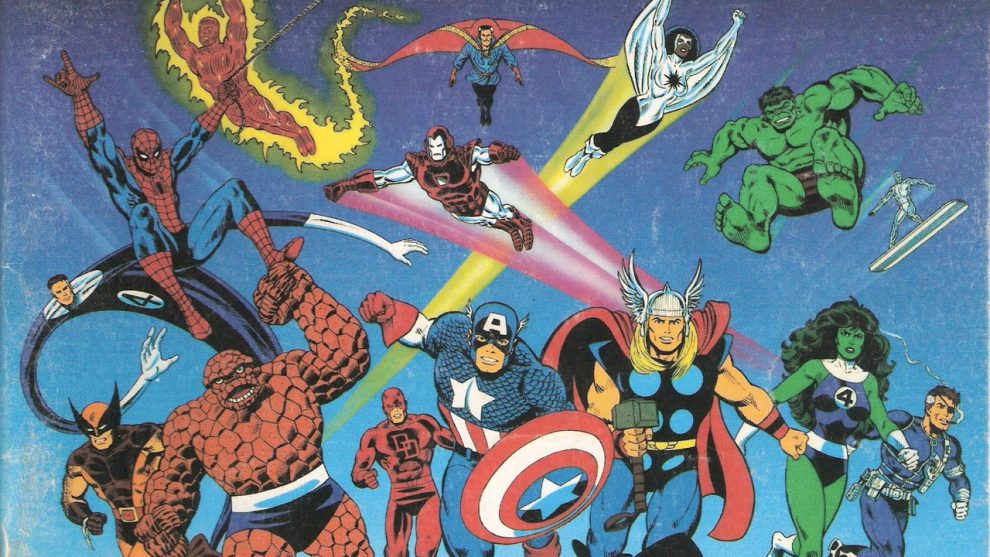

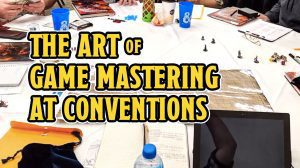
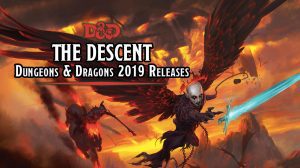
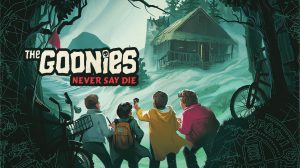




Than, is the 1991 actually a reconciliation of the two? If you were to buy the most up to date version, it would be the 1991 over the Advanced? The naming back to BASIC is confusing
Great review of the game system! I recently wrote a similar look back but with some modern twists and turns to see how the community continues to thrive around Marvel role-playing even though there isn’t a currently in-print game.
https://timbannock.com/how-the-marvel-super-heroes-roleplaying-game-lives-on/
I fondly remember my friends and I ditching zero period in 9th grade to play MSH in the cafeteria. Eventually we formed an school sanctioned Fantasy Role Playing Club after getting booted from the cafeteria. I still have dreams of those wonderful multicolored spreadsheets.
I love this game and am still running it, decades later. I’ve played the others and the original remains the best!